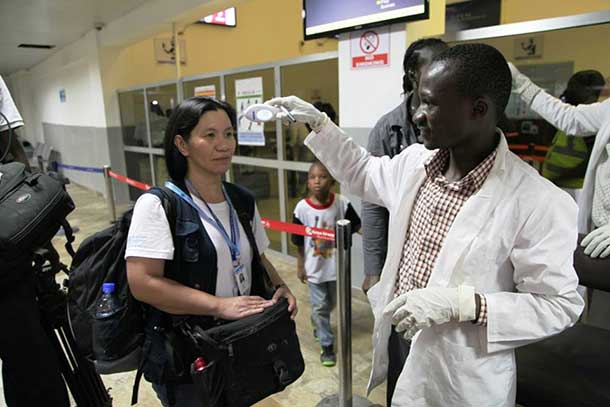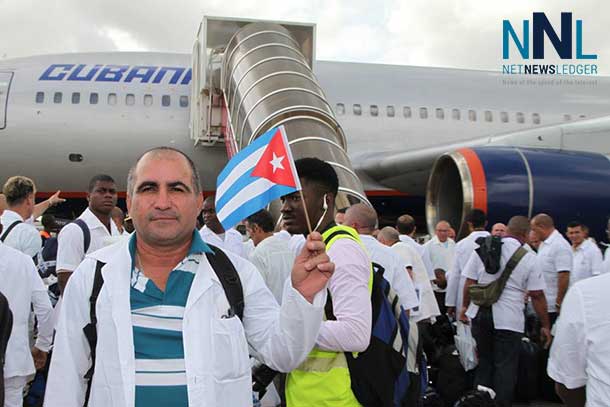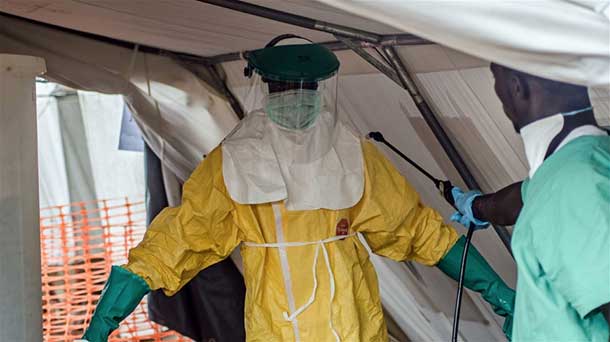

Ebola Virus Fear Factor Plays Strong Role – UN
NEW YORK _ International News – Misinformation about Ebola can only exacerbate an already fragile situation, said United Nations officials at the highest level today, urging international action and solidarity to help West African countries deal with the myriad health and socioeconomic impacts of current outbreak of the deadly virus.
“The fear factor plays a strong role in the crisis. I encourage the Member States and businesses and individuals as well, to take decisions based on scientific evidence, not on fear,” urged UN Deputy Secretary-General Jan Eliasson, as he opened a high-level briefing for Member States at UN Headquarters in New York on the Organization’s response to the unprecedented outbreak.
The latest number of Ebola virus disease (EVD) cases in affected countries Guinea, Liberia, Nigeria, and Sierra Leone, stands at 3,069, with over 1,552 deaths, making this the largest Ebola outbreak ever recorded. An unprecedented number of health care workers have also been infected and died due to this outbreak.
Joining the Deputy Secretary-General were other senior UN officials including Dr. Margaret Chan, Director-General of the World Health Organization (WHO), Dr. David Nabarro, the Senior United Nations System Coordinator for Ebola, Anthony Lake, Executive Director of the UN Children’s Fund (UNICEF), and Hervé Ladsous, Under-Secretary-General for Peacekeeping Operations.
“The outbreak is more than a health crisis,” said Mr. Eliasson, explain that the health systems in the affected countries are overwhelmed by the magnitude and complexity of the problem. These countries are finding it extremely difficult to cope, and as such, the international community must step up its efforts and help boost the capacity of the affected countries and their health systems.
“As far as the UN is concerned, this is one of the most serious health challenges we have ever faced. The reality on the ground is no different from those caused by natural calamities and conflicts of great magnitude – and in some ways even more difficult with dire consequences in several other areas of society,” Mr. Eliasson said.
There have been strong responses by Governments, multilateral and regional organisations, UN agencies, non-governmental organizations and other partners. At the country level, an enormous amount of work is already being done by the UN Missions, peacekeeping operations and UN Country Teams.
Mr. Eliasson went on to say that the Secretary-General has established a United Nations System Ebola Virus Disease coordination mechanism to be guided by leadership provided by WHO and Dr. Nabarro, who just returned from visiting affected countries in West Africa.
“But we cannot do it alone. We need effective strategies, partnerships, and capacities. There cannot be any weak links in this operational chain. We also need to think in unconventional terms and demonstrate speed and flexibility in defining and executing our strategies,” Mr. Eliasson said.
Explaining that the UN is faced with severe strains on its own staff working in such difficult conditions, he said: “We may need to involve Member States in this coordination task. I recall the Tsunami in Southeast Asia and the Haiti earthquake when we had a more active role of Member States in those operations.”
For her part, Dr. Chan said this was the largest, most severe and complex Ebola outbreak ever seen in the nearly 40-year history of this disease. The outbreaks are “racing ahead of the control efforts” in the affected countries.
“Ebola is now being labelled as an African disease, this is not justified, this is unfair and uncalled for. The level of anxiety and fear is high worldwide because of the severity of the disease and there is a lot of misunderstanding,” she said.
The three hardest hit countries are “isolated” and “marginalized” hampering efforts because WHO cannot fly in experts to help. Early treatment has improved the prospect of survival- about 50 percent of people infected survive. People must be educated about high risk exposures such as of unprotected care, unsafe burials, taking care of sick family members at home. Dr. Chan said that WHO and its partners are training “burial boys” and healthcare workers.
Ebola has become a global threat which requires urgent global efforts in solidarity with affected countries. Efforts must be led by national authorities.
The outbreak “will get worse before it gets better” and it requires a well-coordinated, scale up of outbreak response urgently. It requires creativity and culturally appropriate actions.
Last week, the WHO launched the Roadmap for Ebola response, because it believes this outbreak can and will be controlled. WHO is also coordinating the scientific community to fast track the work on experimental therapies.
“We want to look at the vaccines, we want to look at medicines and identify those with good potential for preventing Ebola or for treating Ebola,” she said.
Stressing the “whole world is responsible and accountable to bring the Ebola outbreak under control,” Dr. Chan urged partners, non-governmental organizations, and Member States to come together to do more.
Meanwhile, on the ground, disruptions in food trade in the three West African countries most affected by Ebola have made food increasingly expensive and hard to come by, the UN Food and Agriculture Organization (FAO) warned today.
“Access to food has become a pressing concern for many people in the three affected countries and their neighbours,” said Bukar Tijani, FAO Regional Representative for Africa in a statement to the press.
In Guinea, Liberia, and Sierra Leone, quarantine zones aimed at combating the spread of the virus have seriously curtailed the movement of food. This has led to panic buying, food shortages and significant food price hikes on some commodities, according to an alert issued by FAO’s Global Information and Early Warning System (GIEWS).
Labour shortages on farms due to movement restrictions and migration to other areas will seriously impact farm production, jeopardizing the food security of large numbers of people.
“With the main harvest now at risk and trade and movements of goods severely restricted, food insecurity is poised to intensify in the weeks and months to come. The situation will have long-lasting impacts on farmers’ livelihoods and rural economies,” Mr. Tijani added.
Guinea, Liberia and Sierra Leone are all net cereal importers, with Liberia being the most reliant on external supplies. However, the closure of border crossings and the isolation of border areas where the three countries intersect are sharply increasing food prices. For example, in Liberia, the price of cassava – drought-tolerant crops – went up 150 per cent within the first weeks of August.
“Even prior to the Ebola outbreak, households in some of the affected areas were spending up to 80 percent of their incomes on food,” said Vincent Martin, Head of FAO’s Dakar-based Resilience Hub, which is coordinating the agency’s response.
“Now these latest price spikes are effectively putting food completely out of their reach. This situation may have social repercussions that could lead to subsequent impact on the disease containment,” Mr. Martin added.
According to WHO, the latest official number of Ebola virus disease cases in Guinea, Liberia, Nigeria, and Sierra Leone stands at 3,069, with over 1,552 deaths, making this the largest Ebola outbreak ever recorded.
It is critical that rural communities understand which practices pose the highest risks of human-to-human transmission as well as the potential spill-over from wildlife. Toward that end, the FAO has activated its networks to help sister agencies communicate risk to affected populations.
Meanwhile, to meet short-term food relief needs, the UN World Food Programme (WFP) has launched an emergency aid operation targeting some 65,000 tonnes of food to 1.3 million people in health centres and quarantine areas.
In a statement today, WFP Regional Director for West Africa, Denise Brown, said that her agency was also multiplying efforts to bring food assistance to people in need and to provide logistical support to sister agencies working to contain the virus.
WFP is deploying a total of 50 additional staff across the three most affected countries and is urging it needs $70 million to carry out its aid operations through November.
Meanwhile, yesterday in Dakar, Said Djinnit, Special Representative of the UN Secretary- General for West Africa (SRSG), held a meeting with the heads of UN regional support teams to review ongoing efforts made to eradicate Ebola and provide support to people affected.
According to a statement released today by the UN Office for West Africa (UNOWA), the Special Representative and the Regional Directors deplored the ongoing socio-economic consequences of Ebola, including in particular the isolation of the affected countries with the risk of stigmatizing people.
The solution is not in travel restrictions but in ensuring that effective preventive and curative health measures are put in place. International resource mobilization is critical as food insecurity could further undermine national government efforts, they reiterated.FILES: DAILY MOTION / REUTERS / United Nations








